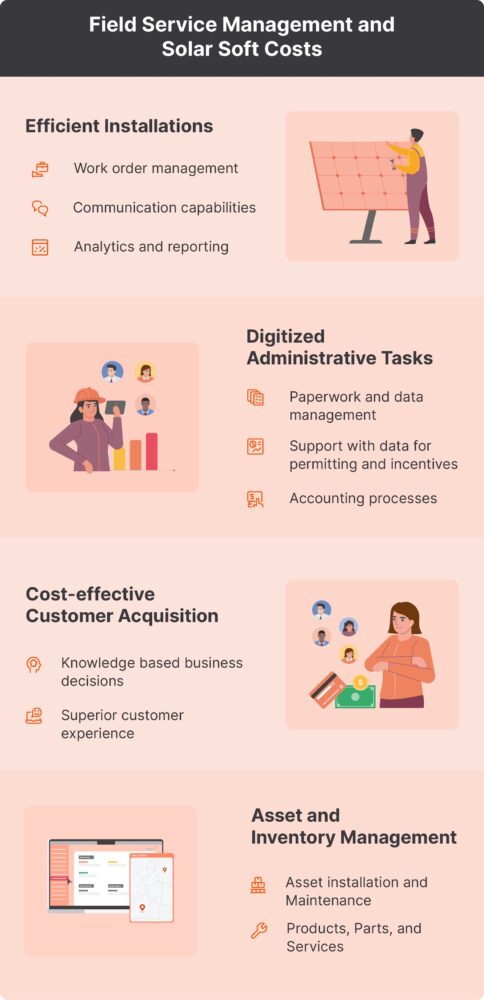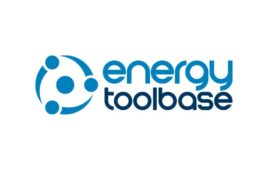By Anand Subbaraj, CEO, Zuper
 The problem of soft costs is not new. They currently make up 65% of the cost for residential PV and 57% total costs for commercial rooftop PV. For many solar businesses they represent a chronic drain on company bottom lines and hurt their ability to differentiate, stay competitive and scale.
The problem of soft costs is not new. They currently make up 65% of the cost for residential PV and 57% total costs for commercial rooftop PV. For many solar businesses they represent a chronic drain on company bottom lines and hurt their ability to differentiate, stay competitive and scale.
However, field service management (FSM) software can take a bite out of those costs. FSM helps field service businesses like solar and storage digitize and automate workflows, processes and overall operations.
Work order management capabilities allow office and onsite teams to coordinate scheduling, fleet tracking, administrative tasks and asset management. Analytics and reporting provide operational oversight while integrations with CRM, project management, inventory and financing software streamline work processes. Additionally, a mobile component lets field crews get information on a job without having to check in with office staff.
Efficient installations
FSM reduces costs during installs by improving project efficiency. Fundamentally, an FSM solution deploys optimization tools that predict the nature and solution of problems so that all company members at all levels operate inside of workflows that are streamlined and agile.
Work order management means teams can create customized and semi-automated workflows for a full view of team capacity, utilization and performance. Features like smart scheduling, route optimization, real-time location tracking, mapping and digitized timesheets allow office staff and crew leads to manage installs and maintenance with complete oversight. This minimizes unnecessary truck rolls, unplanned absences and cancellations and ensures that field techs are worked as efficiently as possible.
Communication between the home office and field techs is vastly improved with field service management. The mobile app allows field techs to send and receive alerts to the back-office in real-time and leave notes about a job. Administration, in turn, has full visibility around field staff arrival times, job details and status plus an ongoing record of all communication. On the customer-facing side, field techs arrive on the job with the most up-to-date project information, able to perform services instantly. Customers receive automated and customized messages and reminders about job status, scheduling changes and invoices.
Reports and analytics with FSM allow executive staff to proactively monitor and examine workflows, employee capabilities, cost allocations, asset and inventory usage and field service trends. They see how issues are identified and reported and assess how well field service resources are utilized.
Digitized administrative tasks
Organized administrative processes lower organizational issues that drain profits such as incorrect customer data, disorganized permitting applications or the need to chase down customer payments.
With FSM, teams have real-time access to all customer and project details in one place, which assures the quality of a job. It mitigates the need for change orders and longer project timelines and enables staff to respond to customer needs quickly. Back office and field staff have shared access to highly organized paperwork and the latest data. Techs use their mobile devices to deliver documents, collect signatures, prep invoices and up-sell services onsite.
System installations involve error-prone, intensive work with a lot of back and forth. FSM arms onsite techs with the most up-to-date data regarding design, qualification information, permitting paperwork and more, minimizing change orders, shortening turnaround time and allowing them to address customer concerns as they go. The platform provides full visibility around design data and delivers the accuracy needed for a commissioning protocol via custom designed checklists and document and image attachments.
Permitting and applications for incentives are soft costs that affect the bottom line. FSM allows teams to digitally organize, track and update all of the data involved in these processes like customer information, project design details and local and state requirements. This minimizes the lag time on the solar business’s end of things, an advantage given how involved and lengthy the process tends to be once they submit.
Accounting with field service management is simplified. Teams administer staff timesheets, project expenses and customer billing and collections such that projects are on track and cash flow is freed up. The platform often includes automated quoting, invoicing and payment collection as well as capabilities that link workflow to the company calendar and sync paid invoices to preferred accounting software. This kind of streamlining makes it easier to collect on payments and upsell additional services.
Cost-effective customer acquisition
Customer acquisition costs can be considerable. Strong referrals and reviews are the best way to secure high-quality, low-cost leads, results that come with superior customer service.
FSM helps businesses improve and personalize the customer service experience. Analytics and reporting give supervisors real time insights into project workflow. Staff pinpoint inefficiencies and make adjustments around installs and service calls by examining key performance indicators and milestone performance. Also, better workflow management with FSM expedites project timelines and delivers comprehensive customer communication. Overall, office and field staff deliver a better kind of customer experience over the lifetime of the relationship.
Increased customer satisfaction and loyalty lead to positive reviews and referrals. It also helps raise the lifetime value of existing customers since it lays the groundwork for additional offerings like energy storage, extended warranties and O&M services.
Asset and inventory management
Solar supply chain costs have fluctuated considerably over the past few years, given policy, shipping and pandemic-related complications. Using assets and inventory at maximum effectiveness mitigates the impact of this variable.
Solar businesses can more easily track and effectively manage use of equipment and parts with field service management. The entire team has an instant and comprehensive overview of company inventory from anywhere using any device. Inventory use is optimized over the lifetime of an install, managing site locations, shipments, PPM and warehouse stock. Field techs know the availability of parts and equipment from their mobile app without needing to check in with the office team.
Field service management helps ease the perennial burden of solar soft costs by providing the kind of operational efficiency and customer engagement modern solar and storage businesses need. Ultimately, it helps them respond faster and get more done as they pursue the vital task of forwarding our nation’s clean energy transition.
Anand Subbaraj is the CEO of Zuper, an AI-powered solution that enables residential and commercial service providers to digitize, automate and optimize their field service processes end-to-end.





Tell Us What You Think!